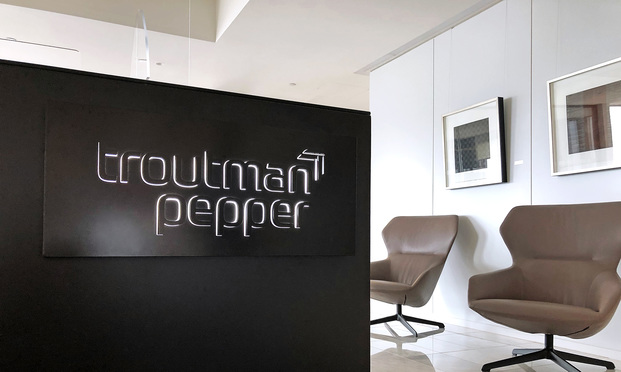Troutman Pepper Merger Goes Live, Even as Pandemic Keeps New Colleagues Apart
The pandemic-induced shutdown has been the greatest immediate challenge for the Troutman Pepper merger, said the firm's vice chair, Thomas Gallagher.
July 01, 2020 at 05:00 AM
8 minute read
The original version of this story was published on The American Lawyer
 Troutman Pepper offices. Courtesy photo
Troutman Pepper offices. Courtesy photo
The long-awaited merger between Atlanta's Troutman Sanders and Philadelphia's Pepper Hamilton finally went live Wednesday, after a delayed start date and pay cuts in response to the coronavirus pandemic.
The merger creates a 1,100-lawyer firm, Troutman Pepper Hamilton Sanders—one of the 50 highest-grossing firms in the country based on their 2019 revenues. The legacy firms' combined revenue last year was $900 million.
While initially set to merge April 1, Troutman and Pepper pushed back the effective date to July 1 because of the pandemic. Indeed, the pandemic-induced shutdown has been the greatest immediate challenge for the Troutman Pepper merger, said the firm's vice chair, Thomas Gallagher, as the legacy firms focus on successfully integrating their partnerships and clients.
"We had a great yearning to get face-to-face and get to know people better—but we couldn't do that with our clients or each other," said Gallagher, Pepper's former chairman, in an interview.
Both legacy firms have restricted travel since the pandemic's onset, said Troutman Pepper's CEO and chair, Stephen Lewis, who was formerly Troutman's managing partner, with only "absolutely necessary client travel during the shutdown."
Despite the frustration for Troutman Pepper's 500 partners over the inability to meet in person, Gallagher said delaying the merger date allowed more time for integration via Zoom and phone calls.
"The great unknown," Gallagher said, at the time of the initial April 1 effective date was how integration would go. "It's been terrific—for instance, people [from the legacy firms] have been training each other on their systems."
"There is a lot of excitement across the combined firm about making this effective now," Lewis said.
For now, the new firm's lawyers and staff will celebrate via video at a firmwide event Wednesday afternoon. Troutman Pepper has scheduled its first partner meeting for July 16, also via video. Lewis said the firm hopes to host an in-person partner meeting in the new year, but "it depends on COVID-19 and when the world opens back up."
Both legacy firms made pay cuts in May to prepare for the pandemic's economic effects. "Each firm went into this with a fairly conservative approach, not knowing what the rest of the year looks like," Lewis said.
He added that it was similarly too soon to say when the pay cuts would be restored. "I'd love to do it sooner rather than later," he said.
Asked about the pandemic's effects on Troutman Pepper's anticipated 2020 revenue, Lewis said it was too early to say. "We feel good about where we are for the year," he said. "What happens [financially] depends on where the economy goes. We are doing our best to navigate that."
Transformative Scale
Troutman Pepper's geographic footprint is almost double that of the legacy firms, creating a more national firm with a footprint in eight of the 10 largest U.S. legal markets: Atlanta, Philadelphia, New York, Washington, D.C., Southern California and Silicon Valley—plus Chicago from Troutman and Boston from Pepper.
Several legal market observers have concluded that the merger makes sense because of the firms' complementary footprints, practices and compatible finances.
Troutman's 650 lawyers were in 12 offices concentrated in the Southeast and Pepper's 450 lawyers were in 14 predominantly Northeastern offices. Their only office overlap is in New York, Washington, D.C., and Orange County, California. Troutman Pepper has 26 U.S. offices.
"Having more complete geographic coverage, I think, is going to be compelling for clients," Lewis said.
Troutman Pepper's expanded West Coast footprint had been a priority for each legacy firm, Lewis added. "We hope to use that to continue our growth—and the same with New York and Washington. Those are important markets for U.S. firms and having additional scale there really does help."
Gallagher said another major impetus for the merger was to strengthen existing practices and add new ones. "That gives us opportunities to serve clients better in some of these markets as a national firm," he said.
The combination deepens Troutman Pepper's bench strength in core practices for both firms, such as corporate, litigation, intellectual property, tax and bankruptcy, while adding Pepper's marquee practices in private equity, health care and life sciences to Troutman's strong energy, banking, finance and insurance practices.
Lewis said the merger would not affect existing billing rates from the legacy firms. "One of the great things about the combination is that our rate structures were fairly similar," he explained.
Troutman Pepper's top leaders come from both legacy firms. In addition to Lewis and Gallagher, Tom Cole from Pepper is Troutman Pepper's managing partner and Andrea Farley from Troutman is heading the combined compensation committee.
 L-R: Andrea Farley, Thomas J. Cole, J, Stephen Lewis and Thomas Gallagher. Courtesy photo.
L-R: Andrea Farley, Thomas J. Cole, J, Stephen Lewis and Thomas Gallagher. Courtesy photo.Former Troutman partner John West is heading the new firm's litigation department. The transactional department is headed by Mason Bayler and regulatory and finance is led by Amie Colby, both from Troutman.
Former Pepper partner Bill Belanger is leading the specialized litigation department while Pepper's Rachael Bushey is heading the health sciences group.
While Troutman is the larger of the two legacy firms, their financials are compatible. Both firms reported solid growth last year, with a 5.4% revenue increase for Troutman to $549.6 million and a 4.5% jump for Pepper to $349.4 million. Troutman ranked at No. 70 in the Am Law 100, while Pepper stood at No. 106 in the Second Hundred.
Revenue per lawyer last year was quite close for both: $828,000 for Troutman and $818,000 for Pepper. Profit per equity partner was a bit further apart: $1,164,000 for Troutman and $943,000 for Pepper.
Market Response
While trying to integrate two large firms during a pandemic creates challenges, Gallagher said feedback from clients and the legal community at large has been one fun aspect. "It's been really rewarding to get these positive communications from all corners, including clients," he said.
Lawyers at other firms—in Philadelphia and elsewhere—have gotten in touch to say they've worked on deals with Troutman lawyers that went well, Gallagher said, "and rattled off names of [Troutman] people I should meet."
Lewis added that he and Gallagher have also heard from lawyers in Europe and Asia who wanted to share positive experiences about the legacy firms. "It's exciting and affirming that others familiar with both firms see what we see—and see the benefit."
Asked to name Troutman Pepper's most distinguishing feature, beyond its expanded size and footprint, Lewis said that it was a shared client-centric focus from the legacy firms.
Gallagher said that when the firms' partners started talking last year it was about their approach to client service, instead of "ourselves or each other."
"We're committed to taking care of our clients—and this [merger] looks like the right way to enhance our ability to do that," he said.
Pepper has not undertaken any major mergers over its 130-year history, but Troutman has completed several other significant combinations, starting with its 2001 merger with Mays & Valentine, a 150-lawyer Virginia firm, that was the largest-ever at the time for an Atlanta-based firm.
Troutman subsequently entered the New York market in 2005 by acquiring the 90-lawyer New York office of now-defunct Jenkens & Gilchrist, and then in 2009 combined with 100-lawyer D.C. boutique Ross, Dixon & Bell, gaining footholds in Chicago and Southern California.
Asked if the merger with Pepper is the most transformative, Lewis said that distinction might go to the Mays & Valentine combination, since it was the first big merger for the legacy Troutman firm. Troutman at the time had about 300 lawyers and only one U.S. office outside Atlanta, in Washington.
"But none have been on this size and scale—and with a firm like Pepper Hamilton," Lewis said.
This content has been archived. It is available through our partners, LexisNexis® and Bloomberg Law.
To view this content, please continue to their sites.
Not a Lexis Subscriber?
Subscribe Now
Not a Bloomberg Law Subscriber?
Subscribe Now
NOT FOR REPRINT
© 2025 ALM Global, LLC, All Rights Reserved. Request academic re-use from www.copyright.com. All other uses, submit a request to [email protected]. For more information visit Asset & Logo Licensing.
You Might Like
View All
GOP Now Holds FTC Gavel, but Dems Signal They'll Be a Rowdy Minority
6 minute read
‘Diminishing Returns’: Is the Superstar Supreme Court Lawyer Overvalued?

Eighth Circuit Determines No Standing for Website User Concerned With Privacy Who Challenged Session-Replay Technology
7 minute read
Leaning Into ‘Core’ Strengths, Jenner’s Revenue Climbs 17%, Profits Soar 23%
4 minute readLaw Firms Mentioned
Trending Stories
- 1Georgia Justices Urged to Revive Malpractice Suit Against Retired Barnes & Thornburg Atty
- 2How Gibson Dunn Lawyers Helped Assemble the LA FireAid Benefit Concert in 'Extreme' Time Crunch
- 3Lawyer Wears Funny Ears When Criticizing: Still Sued for Defamation
- 4Medical Student's Error Takes Center Stage in High Court 'Agency' Dispute
- 5'A Shock to the System’: Some Government Attorneys Are Forced Out, While Others Weigh Job Options
Who Got The Work
J. Brugh Lower of Gibbons has entered an appearance for industrial equipment supplier Devco Corporation in a pending trademark infringement lawsuit. The suit, accusing the defendant of selling knock-off Graco products, was filed Dec. 18 in New Jersey District Court by Rivkin Radler on behalf of Graco Inc. and Graco Minnesota. The case, assigned to U.S. District Judge Zahid N. Quraishi, is 3:24-cv-11294, Graco Inc. et al v. Devco Corporation.
Who Got The Work
Rebecca Maller-Stein and Kent A. Yalowitz of Arnold & Porter Kaye Scholer have entered their appearances for Hanaco Venture Capital and its executives, Lior Prosor and David Frankel, in a pending securities lawsuit. The action, filed on Dec. 24 in New York Southern District Court by Zell, Aron & Co. on behalf of Goldeneye Advisors, accuses the defendants of negligently and fraudulently managing the plaintiff's $1 million investment. The case, assigned to U.S. District Judge Vernon S. Broderick, is 1:24-cv-09918, Goldeneye Advisors, LLC v. Hanaco Venture Capital, Ltd. et al.
Who Got The Work
Attorneys from A&O Shearman has stepped in as defense counsel for Toronto-Dominion Bank and other defendants in a pending securities class action. The suit, filed Dec. 11 in New York Southern District Court by Bleichmar Fonti & Auld, accuses the defendants of concealing the bank's 'pervasive' deficiencies in regards to its compliance with the Bank Secrecy Act and the quality of its anti-money laundering controls. The case, assigned to U.S. District Judge Arun Subramanian, is 1:24-cv-09445, Gonzalez v. The Toronto-Dominion Bank et al.
Who Got The Work
Crown Castle International, a Pennsylvania company providing shared communications infrastructure, has turned to Luke D. Wolf of Gordon Rees Scully Mansukhani to fend off a pending breach-of-contract lawsuit. The court action, filed Nov. 25 in Michigan Eastern District Court by Hooper Hathaway PC on behalf of The Town Residences LLC, accuses Crown Castle of failing to transfer approximately $30,000 in utility payments from T-Mobile in breach of a roof-top lease and assignment agreement. The case, assigned to U.S. District Judge Susan K. Declercq, is 2:24-cv-13131, The Town Residences LLC v. T-Mobile US, Inc. et al.
Who Got The Work
Wilfred P. Coronato and Daniel M. Schwartz of McCarter & English have stepped in as defense counsel to Electrolux Home Products Inc. in a pending product liability lawsuit. The court action, filed Nov. 26 in New York Eastern District Court by Poulos Lopiccolo PC and Nagel Rice LLP on behalf of David Stern, alleges that the defendant's refrigerators’ drawers and shelving repeatedly break and fall apart within months after purchase. The case, assigned to U.S. District Judge Joan M. Azrack, is 2:24-cv-08204, Stern v. Electrolux Home Products, Inc.
Featured Firms
Law Offices of Gary Martin Hays & Associates, P.C.
(470) 294-1674
Law Offices of Mark E. Salomone
(857) 444-6468
Smith & Hassler
(713) 739-1250








